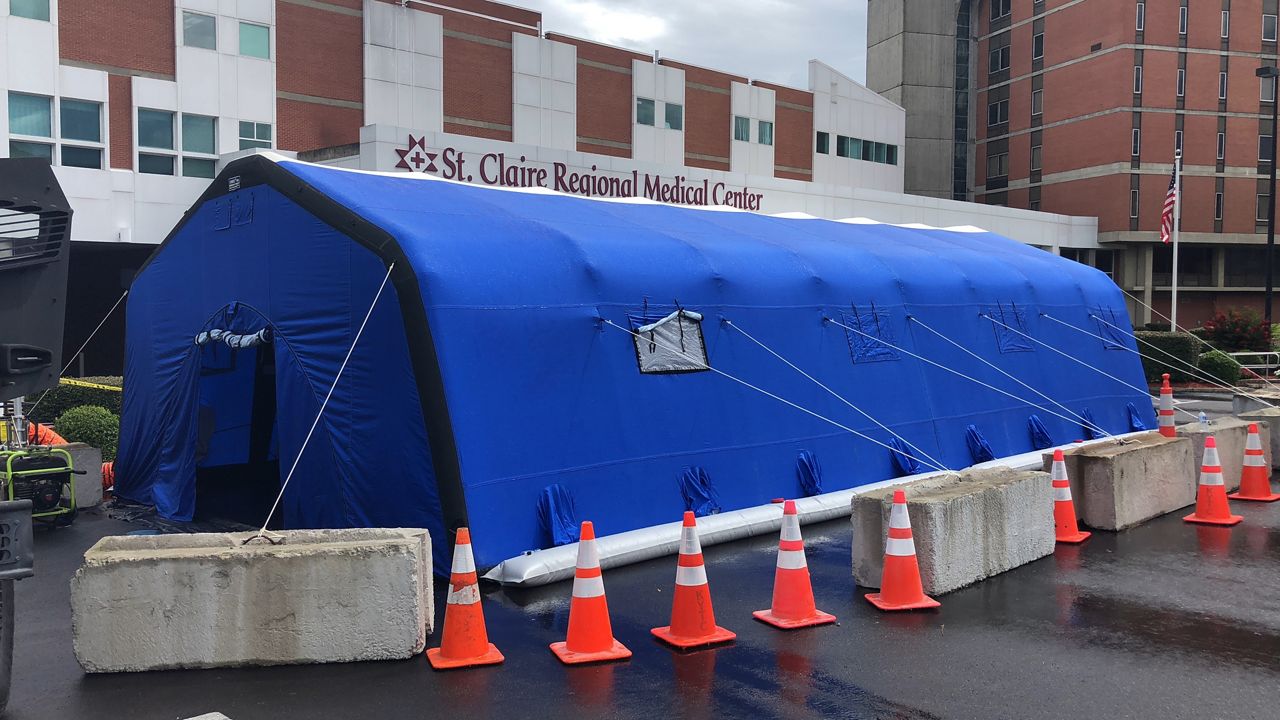MOREHEAD, Ky. — The surge of COVID-19 cases continues to grow in a central eastern Kentucky region.
What You Need To Know
- St. Claire Healthcare is seeing record number of COVID-19 cases
- A doctor describes what its like inside a COVID-19 ICU
- The on-going pandemic is impacting the region
- The hospital started offering more monoclonal antibody therapy in their re-purposed field hospital
St. Claire Regional Medical Center is hitting record numbers in hospitalizations and acute care in the battle against the coronavirus.
In August, SCH transformed their post-anesthesia unit into a COVID-19 surge ICU, and later added a field hospital in their parking lot.
The on-going pandemic is heavily impacting the region. Spectrum News 1 asked one of the many doctors and nurses at SCH to describe the COVID-19 ICUs.
“Scary,” said Dr. Brad Baker as he sighed. He came to SCH as a resident in 2014 and joined their medical staff in 2016. “You know, it's really easy sometimes to to get in a flow of how you do things.”
Throughout his medical career, Baker has put himself in a routine. The pandemic has thrown a huge curveball.
During the interview, Dr. Baker described a touching moment of a patient whose husband never missed a birthday.
“It’s really changed me. I'm sorry,” Baker said as he teared up.
The touching moment left him with a glimmer of hope even though the patient died soon after.
“I'm grateful to be here, because I feel like I've been given the chance to be a part of this. And a lot of people don't get that, but they don't get an opportunity to try and make a difference,” Dr. Baker said.
The last month has become a blur for Baker and other healthcare workers at SCH with increases in patients with COVID-19.
“Yeah, I try not to see dark, try not to see the dark because if you do it eats you. It makes it impossible to do what you what you have to do,” Baker said.
As of Tuesday, they were treating 80 people, 44 are hospitalized of that 37 are not fully vaccinated and 36 patients in their acute at home care with only two people fully vaccinated.
"Once people come through the doors here, vaccination status does is really only important in the matter of knowing, you know, maybe you won't get as sick as someone else but after that, it doesn't matter anymore you know our job becomes trying to make you well and get you better as quickly as possible,” Baker said.

Outside in the re-purposed field hospital in the parking lot, another team takes care of patients receiving monoclonal antibody therapy.
“So today is very pretty full. And we've been doing just a couple of patients just kind of get our process down. Today we're up to 21 patients that will be coming in for the injection,” said Jennifer Hardin, Director of HomeCare Services.
SCH began offering monoclonal antibody therapy for patients who have tested positive for COVID-19 or had close contact with someone who tested positive, and are at high risk for complications from the virus.
“I expect that number to escalate quickly, and we hope to be able to create a capacity to fulfill that needs,” Hardin said.
On Tuesday, Gov. Andy Beshear said the federal government announced a change in the way COVID-19 monoclonal antibody treatments will be distributed among states due to supply shortages and extraordinary demand across the country.
The treatment is used for patients with mild to moderate COVID-19 symptoms who progressively worsen to severe symptoms.
“Today, we have sufficient amount to get us through what we feel like the demand will be for just this week, but that is a concern going forward, is that the demand for the drug is going to be greater than the supply that we have. so that is, that is a concern that we do have,” Hardin said.
Inside the hospital, patient care and support continues even during the tough days.
“When I see the respiratory therapists and the nurses and out there on the floor working hard,” Dr. Baker said. “And then I see these people on the outside who just want some hope. It really it's, it's inspiring. It keeps you going.”
SCH began offering monoclonal antibody therapy through its homecare program in August, but the demand for treatment grew so quickly, they’ve had to expand capacity into their field hospital this week. Earlier this month, members from the Kentucky National Guard began helping staff with non-medical duties.



